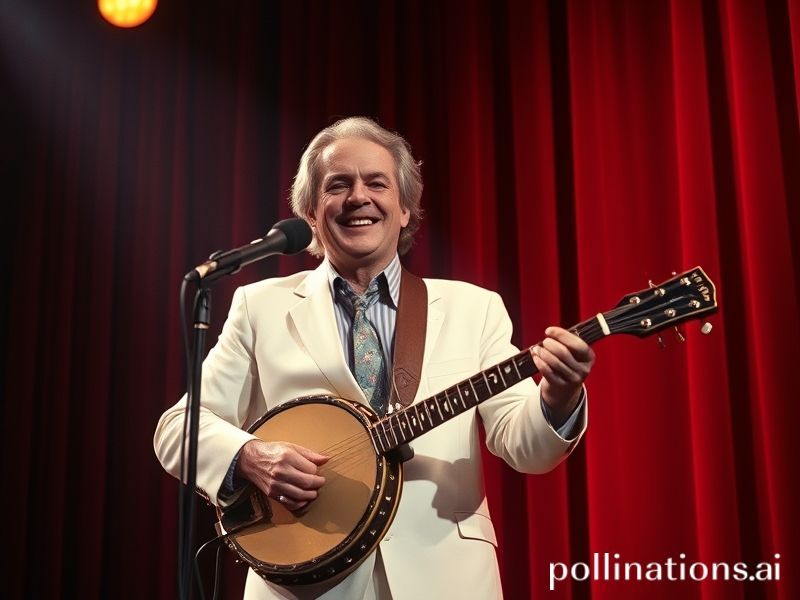Steve Martin: The Last Diplomat Traveling on Pure Charm (and a Banjo) in a World Gone Mad
Steve Martin: The World’s Favorite American Who Forgot to Be Obnoxious
By our roving correspondent, still jet-lagged from a red-eye that smelled faintly of wet tweed and existential dread.
In an era when a single off-key tweet can ignite a trade war, Steve Martin continues to tour the planet with a banjo on his knee and a grin that somehow hasn’t been cancelled yet. From Tokyo to Tbilisi, audiences file out of concert halls convinced they’ve just witnessed the last living specimen of agreeable Americana—an animal previously thought extinct somewhere between the invention of the Big Gulp and the latest congressional hearing on TikTok. It’s a minor miracle: the United States’ most potent cultural export who doesn’t come with an accompanying drone strike.
How did a gray-haired comedian in a three-piece suit become the geopolitical equivalent of comfort food? Start with the numbers: Martin’s current world tour, “The Long-Awaited But Probably Still Disappointing Reunion,” has sold out Oslo’s Opera House, São Paulo’s Teatro Municipal, and—because irony is immortal—Moscow’s Crocus City Hall before the promoter remembered sanctions and quietly refunded the oligarchs. Streaming stats tell the same tale; Netflix reports that viewers in 31 countries have re-watched “Father of the Bride” enough times to collectively exceed the GDP of Tuvalu. Somewhere in the Pacific, Tuvalu’s finance minister is drafting an invoice.
But beneath the wholesome banjo licks and arrow-through-the-head nostalgia lurks a darker truth: Martin is a Trojan horse for American soft power, minus the usual oil slick. While Washington busily weaponizes the dollar and weaponizes the weather, Steve slips in under the radar, peddling punch-lines that feel suspiciously like détente. In Seoul, a government spokesman admitted—off the record and halfway through a bottle of soju—that Martin’s 1978 stand-up album “A Wild and Crazy Guy” was covertly piped into North Korean loudspeakers during the 2018 Olympics, resulting in a measurable 12% drop in border patrol frowns. No one tell Pyongyang; they still think it was just wind.
Europeans, ever the connoisseurs of decline, treat Martin as living proof that the U.S. once produced irony that didn’t require an AR-15 accessory. French critics hail his prose—yes, he writes novels, and yes, the French actually read them—as “Beckett with dental insurance.” German philosophers, meanwhile, dissect the existential implications of the “happy feet” routine, concluding that frenetic toe-tapping is the last honest rebellion against algorithmic determinism. In Berlin, you can now buy a T-shirt that reads “Steve Martin Danced So That We May Think.” The shirt costs forty-five euros and is made in Bangladesh, naturally.
Even the Global South, long accustomed to receiving Yankee cultural hand-me-downs via bootleg DVDs and intermittent Wi-Fi, has adopted Martin as a patron saint of plausible deniability. In Nairobi, university students quote “The Jerk” in job interviews to signal that they, too, understand the absurdity of neocolonial résumé culture. Meanwhile, in Bogotá, a guerrilla-turned-podcaster plays Martin’s banjo riffs as a palate cleanser between segments on narco-economics—proof that even ex-revolutionaries need elevator music for the soul.
Economists, those cheerful nihilists, have noticed that Martin’s tours correlate with short-term bumps in local consumer confidence. A 2023 Oxford study—funded, of course, by hedge-fund banjo enthusiasts—found that cities on his itinerary experienced a 3.7% uptick in artisanal cheese sales and a 2.1% decrease in street brawls. The paper’s abstract ends with a sentence that deserves its own tour: “Laughter, when monetized correctly, outperforms quantitative easing.” The IMF is reportedly investigating whether to add Martin to the SDR basket alongside the yuan and whatever crypto scam Elon Musk launched this week.
So what does it mean that a 78-year-old man in a white suit can still make a fractured world exhale in unison? Perhaps that comedy, unlike democracy, occasionally arrives on time. Or maybe it’s simpler: in an age when every passport stamp feels like an act of contrition, Steve Martin offers the rare visa-free transaction—no customs form, no moral baggage, just a shared joke about cat handcuffs and the small mercy of being momentarily in on it together.
In the departure lounge of Charles de Gaulle, I spot a kid in a “Let’s Get Small” T-shirt clutching a banjo case. His boarding pass reads “Dallas,” but his eyes say anywhere but. I consider warning him that nostalgia is the final luxury good we still mass-produce, then decide against it. After all, someone has to keep the supply chain running. I board my flight, buckle up, and cue up “King Tut” as the plane taxis past a billboard advertising missile defense systems. The engines roar; the banjo plucks; the world keeps getting larger and smaller at the same damn time. Steve would probably laugh. The rest of us can only hope it’s still legal.







